In the low-lying Gelderse Valley some 85km east of Amsterdam, a Dutch university is changing how humans eat.
There, a bright-eyed press officer with Willy Wonka flair is showing me the miracles of modern food science. One laboratory door swings open to reveal giant, fragrant basil leaves growing under multicoloured lights. In a greenhouse nearby, thousands of tomatoes are suspended mid-air like plump, levitating Buddhas. A few steps away, I shake hands with a world-famous banana scientist, who dreams of introducing Europeans to the many varieties of banana eaten across Asia, Africa and Latin America, and ending the tyranny of the common yellow Cavendish.
For miles in every direction, fields bulge with crops; in some, drones monitor soil fertility, in others, giant luminescent panels light up greenhouses at night. The press officer is accustomed to impressing visitors. “What do you think?” he asks at every turn.
The Netherlands is not a big place. You can drive across the whole country from the north to the south in under four hours. And yet it ranks consistently among the world’s top food exporting nations, in terms of gross value. The country’s surpluses are mind-boggling; how does the second largest exporter of tomatoes and onions also produce such outsize quantities of dairy and potatoes, and export more eggs than any nation on Earth? The mystery of how this tiny patch of northern Europe does it draws government delegations, multinational companies and agriculture students from around the world to marvel at the nucleus of the Dutch innovation juggernaut: Wageningen University.
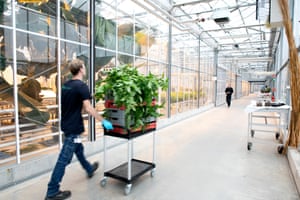
Wageningen is set to face its biggest challenge yet. By 2050, according to some estimates, the number of mouths to feed on Earth will exceed 9.7 billion. That’s the equivalent of having a second Europe and a second Africa on the planet. To feed all of humanity, according to the World Resources Institute, we will need to produce 56% more food while avoiding further deforestation. The climate crisis will not help: pests will multiply as temperatures rise; floods, droughts and extreme weather will ravage crops; and desertification will take large bites out of currently available arable land.
Broadly speaking, humankind has two paths to choose from to confront what is about to happen. One option – we innovate our way out. Wageningen’s science addresses some of the biggest problems in our food supply system today: scientists there are developing plant-based meat, vertical farms and gene-editing technology. If the answer to the problem of humanity’s survival is going to come out of a laboratory, there’s a good chance that it will happen in Wageningen. Multinational companies and energetic startups are pouring money into the university; the collective brainpower of 8,000 international food scientists is part of the machinery that will determine how humans of the future will eat.
The other option – championed by a small but spirited group of Wageningen students – is rather more drastic. Neurosis about surplus and production, the students say, has driven the Earth to crisis point. Hunger continues, even as agriculture occupies 40-50% of the earth’s habitable land, guzzles 70% of all freshwater, and accounts for about 10-12% of the total global greenhouse gas emissions caused by humans. A third of food produced globally is wasted, while many of the world’s hungriest people are farming cash crops such as flowers and tobacco, the students say. The cycle of year-on-year growth fuels unnecessary demand, while market-led models of resource allocation cause huge inequalities in access to food. The Wageningen model, one student tells me, is flawed. “The question of how to feed the world is a political one,” she says.
Global hunger

Louise Fresco, one of the world’s leading food scientists and president of Wageningen University, has been thinking about how to feed the world since she was 15 years old. In 1967, the budding scientist saw photographs of a famine in Biafra, Nigeria, and awakened to the urgency of global hunger. The images set Fresco off on journeys to Papua New Guinea and the Democratic Republic of the Congo, where she witnessed scarcity first-hand – in her book, Hamburgers in Paradise, she recalls eating roasted palm beetles and python in tomato sauce on these trips to poverty-stricken countries. “I contemplated how little was available to the world’s population,” she writes.
Fresco was born in the aftermath of one of the most traumatic chapters in modern Dutch history, a manmade famine known as the Hunger Winter during the second world war in which about 20,000 Dutch people starved to death in a few months, as wartime rations in some regions fell to 500 calories per day. The echo of this event, encapsulated in the postwar slogan: “hunger – never again”, reverberates through my conversation with Fresco, and through many conversations I have at Wageningen. “I always felt that the coincidence of birth should be translated into some kind of a moral responsibility,” Fresco says in an interview at her office. “There was a great sense that something had to be done, that there is more than just going about your own life and being rich and happy.”
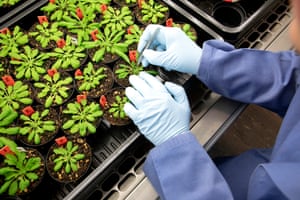
The Dutch obsession with agricultural surplus is at the heart of the story of Europe. In the years after the war, the Netherlands’ agriculture minister Sicco Mansholt piloted large-scale mechanised farming. Mansholt wanted to secure the country’s food supply by increasing production. Heavy machinery, chemical fertilisers, and new research and technology were part of a modernising mission that Mansholt later evangelised across the continent as the first European commissioner for agriculture through the common agricultural policy. He sought to build a postwar Europe of plenty while lifting small farmers out of poverty and integrating Europe’s economies.
But by the 1980s, CAP’s guaranteed minimum prices for farmers led to production overdrive, environmental devastation and obscene amounts of waste: Europe was paying millions to store hoards of unwanted meat, undrinkable “wine lakes” and mountains of grain and butter. Agriculture was devouring nearly 70% of the EU budget, disproportionately rewarding the biggest, most efficient producers. European popstars advanced the rhetoric of their leaders, singing “feed the world, let them know it’s Christmas” while their countries used export subsidies to dump surpluses on world markets at knockdown prices.
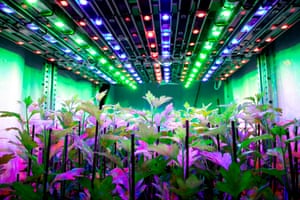
Public opinion turned against Europe’s state-sponsored excesses, in favour of efficiency-driven American capitalism. Wageningen was suffering an existential crisis. “There was a questioning (sic) of – should we take responsibility, shouldn’t the market do things?” said Fresco, who at the time was a rising star at the UN Food and Agriculture Organization and would have been aware of the waste mountains and the first international conversations about sustainability. Wageningen’s establishment turned to the giants of industry to keep the university afloat.
Walking around Wageningen with Fresco, I am struck at how the town has compartmentalised the angst and suffering of the war in a small museum in its cobbled old quarter. The futuristic Wageningen next door is unsentimental and solution-focused. Its glossy, modernist buildings architecturally distance the lingering emotion of Europe’s history, and invite in only reason and logic. Big money propels Wageningen’s new swagger. Sleek corporate buildings of companies such as Unilever and Dutch dairy giant FrieslandCampina blend seamlessly into the campus architecture and the old university town has rebranded as “Food Valley” – a shiny agri-tech mecca with one big goal: shaping the future of food.

This mission-driven Wageningen is providing dazzling solutions to humanity’s impending food supply problem. As an example, one of the university’s star scientists Leo Marcellis is pioneering new vertical farming techniques as a possible solution to producing more food without using more land. Marcellis grows plants in tiered shelves inside highly monitored labs. The potential of this innovation is immense, he says, conjuring skyscrapers of herbs and abandoned buildings stacked with vegetable farms. But there is a small-print environmental cost attached, Marcellis admits. His vertical farms require huge inputs of artificial light, and are partially funded by Phillips, the lightbulb manufacturer. Marcellis’ land-saving vertical farms, it emerges, will require quite a lot of lightbulbs.
The close relationship between Wageningen scientists and industry makes many people uncomfortable. Dutch investigative journalist Vincent Harmsen from One World magazine recently went to court asking Wageningen to release information about scientists’ communications with Syngenta, Monsanto and Bayer, large agrochemical firms. The university denied his freedom of information request, and a court upheld the university’s right to do so, on the grounds that Wageningen University’s funding is partially private. But without understanding the relationships between scientists and companies, Harmsen argues, it is impossible to discern scientific fact from company-sponsored fiction.
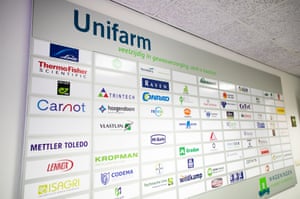
This proximity between science and industry goes all the way to the top of the Wageningen pyramid. Fresco is a paid non-executive director of the multinational Syngenta. She previously held positions at Unilever and Dutch financial firm Rabobank. She argues that collaboration between private companies and science is necessary, and can be positive. Her role at Syngenta, she says, involves advising the company about sustainability. “Syngenta is not influencing Wageningen. It is contracting me, who tries to bring some good ideas to Syngenta. We work with all kinds of industry because we fundamentally believe that these big companies have such an influence in the world that they need to be helped to formulate sustainable products and ideas.”
Forest farming
Meanwhile, on an abandoned apple orchard in Wageningen, a handful of students are planting a forest.
In it, they will grow pumpkins, walnuts and berries. The aim is to demonstrate that small-scale farming is viable and more environmentally friendly than industrial mega-farms. “Louise Fresco still thinks quite a lot in terms of ‘we have to feed the world’,” says Louise Vercruysse, one of the students planting the farm. “I’m not really into that. You have to first look at why the world can’t feed itself.”
The young Wageningeners believe that profit-seeking industrial farming has driven the planet to the edge of crisis. The Netherlands’ fantastical food production messaging has hidden modern agriculture’s assault on the environment for years, says Vercryusse. Dutch bees and butterflies are vanishing at astonishing speed, while Dutch children are suffering from pollution-induced asthma at rates higher than any country on the continent. Nitrogen levels, caused in part by hyperproductive Dutch dairy farms, when mapped from space resemble a wound over the country. To combat emissions, in 2019 Dutch courts delayed 18,000 construction projects and cut the national speed limit.
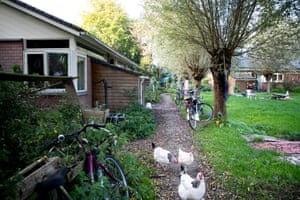
The activist students say Wageningen’s curriculum is still prioritising industry over the environment. To introduce new ideas to her peers, student Eva van Dijk, organises lunchtime lectures by Wouter van Eck and champions forest farming – where food is foraged or cultivated in ecologically diverse forest ecosystems.
Far from feeding the world – Van Eck tells the students, European colonisers destroyed the world’s indigenous food production systems. Eighteenth-century Europeans did not recognise the indigenous plants of the Americas, seeing instead only timber forests that needed felling. Now, he says, Europe is trying to export its broken agriculture system to solve a hunger crisis it created.
Van Eck argues that the calculations used to bump the Netherlands up in the export rankings are misleading. They are based on the monetary value of exports rather than the quantity or nutritional value of the produce. The Dutch dairy industry, for example, buys huge amounts of fodder from Brazil, using up farmland that could be used to grow food for Brazil’s native population. To Van Eck, the idea that the Netherlands’ surpluses feed the world, is a hollow and dangerous lie. “The Netherlands is a black hole for food production,” he says. “Wageningen is not part of the solution, you are part of the problem.”

Van Eck gets a rockstar reception from the auditorium full of students attending the lecture. A number of them surround him at the end to examine the baskets of forest-grown fruit and herbs he has brought along and ask him if they can organise internships at his forest farm.
Activist students at Wageningen organise underground seed exchanges, encouraging farmers to bypass the highly regulated, industry-dominated seed market. Some organise events where they throw seed “bombs” into parks and fields to break the monotony of the Netherlands’ controlled green spaces.
The students believe the rational response to ecological crisis is to produce and consume less, even if it causes an economic backslide. This idea is catching fire around the world. Economists like Giorgos Kallis who champion “degrowth“, say western economies have achieved an optimal state, and should stop chasing GDP-driven yearly growth and focus instead on limiting environmental damage. At last year’s UN Climate Action Summit in New York, Greta Thunberg rebuked world leaders for continuing to pursue economic rather than ecological goals. “You are failing us,” she said.
The young Wageningeners are aware that they will live through an era of environmental calamity that will shape their entire lives. Their university years lack outward signs of frivolous indulgence and instead are characterised by astounding personal choices. At Droevendaal, an ecological complex near the university, Van Dijk tells me the students bulk order organic produce like cereal and rice and share it between houses to keep costs low. Their primary mode of transport is cycling. They spend their spare time cultivating vegetable patches in their gardens and eat omelettes made from fresh eggs from chickens roaming the area. Solar panels provide their energy. Unwanted clothes, books and scrap are traded in a shed called the “Giveawayshop” to minimise waste.
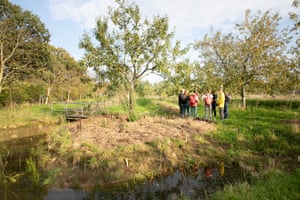
The students’ ideas, though, are untested. Van Eck admits in his lecture that his technique of farming is still a pilot project, and that he is not advocating for all farmers to turn their fields into forests. Scientists have raised questions about other alternative farming methods in the past. Many argue, for example, that some organic fertilisers and pesticides, though natural, can be harmful to the environment. Plus, lower yields on organic farms could mean having to use more land – which could lead to further deforestation.
Disrupting food supply chains runs huge socio-economic risks, threatening millions of livelihoods around the world. In February, thousands of farmers in angry tractor convoys protested at The Hague, where parliament sits, fearing that debates about the environmental impact of Dutch agriculture could wipe out their businesses.
On the apple orchard, the students agree that their experiments are only a starting point for the questions facing humanity. “I am still figuring out what I think the ideal path is,” said one, as I was leaving. “One thing is clear. The system we have now is not going to feed the planet without completely destroying the Earth.”
